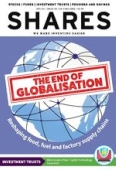Archived article
Please note that tax, investment, pension and ISA rules can change and the information and any views contained in this article may now be inaccurate.
How food group Kellogg’s breakup provides a blueprint for unloved Unilever

Corn Flakes, Rice Krispies and Pringles maker Kellogg (K: NYSE) is to separate into three independently listed food businesses focused on snacks, cereals and plant-based food in a bid to unlock value for shareholders.
Kellogg’s break-up is following in the footsteps of corporate giants such as GSK (GSK), General Electric (GE:NYSE) and Toshiba (TYO:6502) and could create a blueprint for UK consumer goods giant Unilever (ULVR) to follow.
Set to complete by the end of 2023, Kellogg’s separation will see the food giant spin off US, Canadian and Caribbean cereal and plant-based businesses which collectively represented about 20% of Kellogg’s sales in 2021.
The remaining business, which accounted for roughly 80% of sales in 2021, will have a sharpened focus on global snacking, international cereal and noodles and North America frozen breakfast products.
Kellogg’s boss Steve Cahillane said all three businesses have ‘significant standalone potential’, though he is staying on as CEO of the faster growing and higher margin global snacking company which makes brands including Cheez-It and Pop-Tarts.
Interestingly, there was no activist investor pushing for the Kellogg’s split, as it typically the case with such demergers. It is a different story at Unilever where billionaire activist Nelson Peltz was recently appointed as a non-executive director after taking a stake in the business. Shares in the £92 billion cap are down 16.1% over one year.
Peltz’s arrival adds to the pressure on the Dove-to-Marmite-maker’s beleaguered boss Alan Jope to come up with a market-pleasing strategy after the botched takeover of GSK’s consumer healthcare arm. UK investors will recall Peltz’s presence on Cadbury’s share register led to a break-up and eventual sale of that company.
Breaking up Unilever, whose sprawling range spans everything from plant-based meats, mayonnaise and ice creams to deodorants, washing and bathing products and bleach, could make sense.
Unilever has an enviable collection of brands, but hard-nosed investors have urged the board to break the company up into three separate divisions, namely beauty, food and household products.
In January, Unilever presented its own plan for a ‘simpler, more category-focused business’ built around beauty and wellbeing, personal care, home care, nutrition and ice cream, with its new structure to generate around €600 million of cost savings over two years. Tellingly, food and refreshment was not mentioned as a key business area, implying this part of the business may have been earmarked for sale.
Important information:
These articles are provided by Shares magazine which is published by AJ Bell Media, a part of AJ Bell. Shares is not written by AJ Bell.
Shares is provided for your general information and use and is not a personal recommendation to invest. It is not intended to be relied upon by you in making or not making any investment decisions. The investments referred to in these articles will not be suitable for all investors. If in doubt please seek appropriate independent financial advice.
Investors acting on the information in these articles do so at their own risk and AJ Bell Media and its staff do not accept liability for losses suffered by investors as a result of their investment decisions.
Issue contents
Feature
Great Ideas
Investment Trusts
News
- Apple aims to arrest sagging share price as new product launch rumours swirl
- Investment trusts prove to be key sources of dividends
- The earnings downgrade cycle has only just begun, suggesting more pain ahead
- Copper has entered a bear market and history tells us it’s not a good sign
- Why stock markets are taking Russia's debt default in their stride

 magazine
magazine









